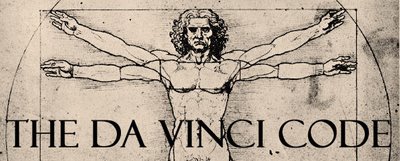
Several days ago, my wife and I saw the controversial film "The Da Vinci Code," based on the novel by Dan Brown. Both the book and the movie are presented as the fictional account of a 2,000 year old cover-up involving the Roman Catholic Church and Opus Dei (an ultra-conservative Catholic sect), resorting to murder as they attempt to conceal evidence of Jesus Christ having been married to Mary Magdalene and fathering a child. The child of Jesus was then supposed to have produced a line a descendants surviving to the present day.
The movies itself was moderately entertaining, but not since the "Last Temptation of Christ" have we seen such a firestorm of righteous indignation.
Novels and films based on fictional theories should hardly produce the kind of reaction "The Da Vinci Code" apparently unleashed on the world, but even before its debut in theatres, Christian churches around the world have been working overtime to expose the "truth," and some even attempted to blacklist the film in certain countries.
Why the visceral response? Why not simply dismiss the film as fantasy and move on?
Maybe some of the protest and furor come from hitting a raw nerve or even a kernal of truth beneath the obvious exxageration. I mean, I seriously doubt Opus Dei sends albino monk/hitmen to protect vital church secrets, but the organization does have a somewhat founded reputation for secrecy, arch-conservatism, and extreme acts of penance. And while nowadays the Roman Catholic Church generally works to stand as a voice for morality and compassion in the world, it's no secret the Church also represents a long history of oppression and bloodshed against Muslims, Jews, Gypsies, women, and homosexuals. Remember the Crusades, the Holy Inquisition, and the supposed witch hunts killing hundreds of thousands, or perhaps even millions of innocent people. I realize Pope John Paul II issued a blanket apology for the sins of the Church back in the year 2,000, but have we as a culture ever really come to grips with why we felt it necessary to murder 500,000 women under the guise of ridding the world of witchcraft? What was so threatening about women?
I have no desire to undermine the faith of millions of people worldwide, and I certainly don't wish to present fiction as something real, but for me "The Da Vinci Code" opens an old wound. When I think of my Native American grandparents who were forcibly converted to Christianity under pain of imprisonment and death, I wonder why so many Christians used the name of Jesus for wrongdoing. Do people really doubt the power of Christ so much they feel obliged to enforce their view of the Bible by the sword? And in modern times, do people doubt the Lord so much they feel it necessary to protest a novel?
Besides, is it really that threatening to believe Jesus may have married and had a family? Wouldn't the idea of a married Jesus actually enhance the case of pro-family Christians? Why can't Jesus be both married and divine?
I believe in God with all my heart. I believe in God's Son. Even so, I feel no need to enforce my views through protest and legislation. I can't help but think those who do so react because of doubt and not faithfulness. Seriously, will the Divine Order of the world collapse if we teach science in public schools and not creationism? Will faith cease to exist in America because we maintain a secular state (and hence freedom of religion)? Will millions of God-fearing families really disintegrate if we allow a small minority of people to practice same-sex marriage? Will God's plan for humanity collapse because of a novel? We see so much emotion around these issues, but for me I go back to the one sign of true discipleship set forth by the Son of God: "By this shall all men know that ye are my disciples, if ye have love one toward another."
It's important to note the test of true discipleship does not rely on legislation, doctrinal orthodoxy, or even moral purity; rather the true followers of Jesus are identified by how powerfully they embody the redeeming love of God. If more Christians actually followed the teachings of Christ and loved their enemies, rather than create new enemies by protesting every time someone disagrees with their theology, the world would be a much better place.
As an aside, I don't believe everyone who attempts to correct misconceptions in the media is a doubting Thomas or a religious bigot. I don't object to the dialogue on either side of these divisive issues, but rather the manner in which people sometimes dehumanize their opponents. I defend the right of people to believe in God or to disbelieve according to the dictates of their own conscience, and I advocate the right of people to disagree with civility regarding fundamental issues of faith and life.
No comments:
Post a Comment